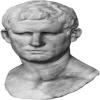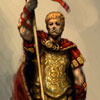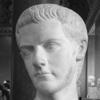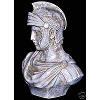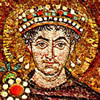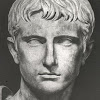Agrippa Marcus Vipsanius
Agrippa Marcus Vipsanius Agrippa (60?-12 B.C.) was a renowned Roman general and close friend of Octavian (Augustus). Agrippa was consul first in 37 B.C. He was also governor of Syria. As general, Agrippa defeated the forces of Mark Antony and Cleopatra at the Battle of Actium. Upon his victory, Augustus awarded his niece Marcella to Agrippa for a wife. Then, in 21 B.C., Augustus married his own daughter Julia to Agrippa. By Julia, Agrippa had a daughter, Agrippina, and three sons, Gaius and Lucius Caesar and Agrippa Postumus (so named because Agrippa was dead by the time he was born).
Augustus (Octavian) caesar
Augustus (Octavian) Caius Julius Caesar Octavianus (September 23, 63 B.C.- August 19, A.D. 14), the grand-nephew and primary heir of Julius Caesar, began his career by serving under Julius Caesar in the Spanish expedition of 46 B.C. Upon his grand-uncle’s assassination in 44 B.C., Octavian went to Rome to be recognized as the (adopted) son of Julius Caesar. He dealt with the assassins of his father and the other Roman power contenders, and made himself the one-man head of Rome — the person we know of as emperor. In 27 B.C., Octavian became Augustus, restored order and consolidated the principate (the Roman Empire). The Roman Empire that Augustus created lasted for 500 years.
Caligula
Caligula Gaius Caesar Augustus Germanicus (A.D. 12 – 41) followed Tiberius to be the third Roman emperor. He was adored at his accession, but after an illness, his behavior changed. Caligula is remembered as sexually perverted, cruel, insane, extravagant, and desperate for funds. Caligula had himself worshiped as a god while still alive, instead of after death as had been done before. Several assassination attempts are thought to have been made before the successful conspiracy of the Praetorian Guard, on January 24, 41.
Cato the Elder
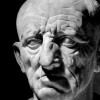
Marcus Porcius Cato (234-149 B.C.), a novus homo from Tusculum, in Sabine country, was an austere leader of the Roman Republic known for coming into conflict with his contemporary, the more flamboyant Scipio Africanus, winner of the Second Punic War. Cato the Younger is the name of one of Julius Caesar’s staunchest opponents. Cato the Elder is his ancestor. Cato the Elder served in the military, especially in Greece and Spain. He became consul at 39 and later, censor. He influenced Roman life in law, foreign and domestic policy, and morality. Cato the Elder despised luxury, especially of the Greek variety his enemy Scipio favored. Cato also disapproved of Scipio’s leniency towards the Carthaginians at the conclusion of the Second Punic War.
Cicero
Cicero (Jan. 3, 106 – Dec. 7, 43 B.C.), best known as an eloquent Roman orator, rose remarkably to the top of the Roman political hierarchy where he received the accolade Pater patriae ‘father of his country’, fell precipitously, went into exile because of his hostile relations with Clodius Pulcher, made a permanent name for himself in Latin literature, and had relations with all the contemporary big names, Caesar, Pompey, Mark Antony, and Octavian (Augustus).
Julius Caesar
Julius Caesar (July 12/13, 102/100 B.C. – March 15, 44 B.C.) may have been the greatest man of all times. By age 39/40, Caesar had been a widower, divorce, governor (propraetor) of Further Spain, captured by pirates, hailed imperator by adoring troops, quaestor, aedile, consul, and elected pontifex maximus. He formed the Triumvirate, enjoyed military victories in Gaul, became dictator for life, and started a civil war. When Julius Caesar was assassinated, his death set the Roman world in turmoil. Like Alexander who began a new historical era, Julius Caesar, the last great leader of the Roman Republic, set in motion the creation of the Roman Empire.
Justinian
the Great Roman Emperor Justinian I or Justinian the Great (Flavius Petrus Sabbatius Iustinianus) (482/483 – 565) is known for his reorganization of the government of the Roman Empire and his codification of the laws, the Codex Justinianus, in A.D. 534. Some call Justinian “the last Roman,” which is why this Byzantine emperor makes it to this list of important ancient people that otherwise ends in A.D. 476. Under Justinian the Hagia Sophia Church was built and a plague devastated the Byzantine Empire.
Nero
Nero was the last of the Julio-Claudian emperors, the most important family of Rome that produced the first five emperors (Augustus, Tiberius, Caligula, Claudius, and Nero). Nero is famed for watching while Rome burned and then using the devastated area for his own luxurious palace and blaming the conflagration on the Christians, whom he then persecuted.
Scipio Africanus
Scipio Africanus or Publius Cornelius Scipio Africanus Major won the Hannibalic War or Second Punic War for Rome by defeating Hannibal at Zama in 202 B.C. Scipio, who came from an ancient Roman patrician family, the Cornelii, was the father of Cornelia, the famous mother of the social reforming Gracchi. He came into conflict with Cato the Elder and was accused of corruption. Later, Scipio Africanus became a figure in the fictional “Dream of Scipio”. In this surviving section of De re publica, by Cicero, the dead Punic War general tells his adoptive grandson, Publius Cornelius Scipio Aemilianus (185-129 B.C.), about the future of Rome and the constellations. Scipio Africanus’ explanation worked its way into medieval cosmology.

